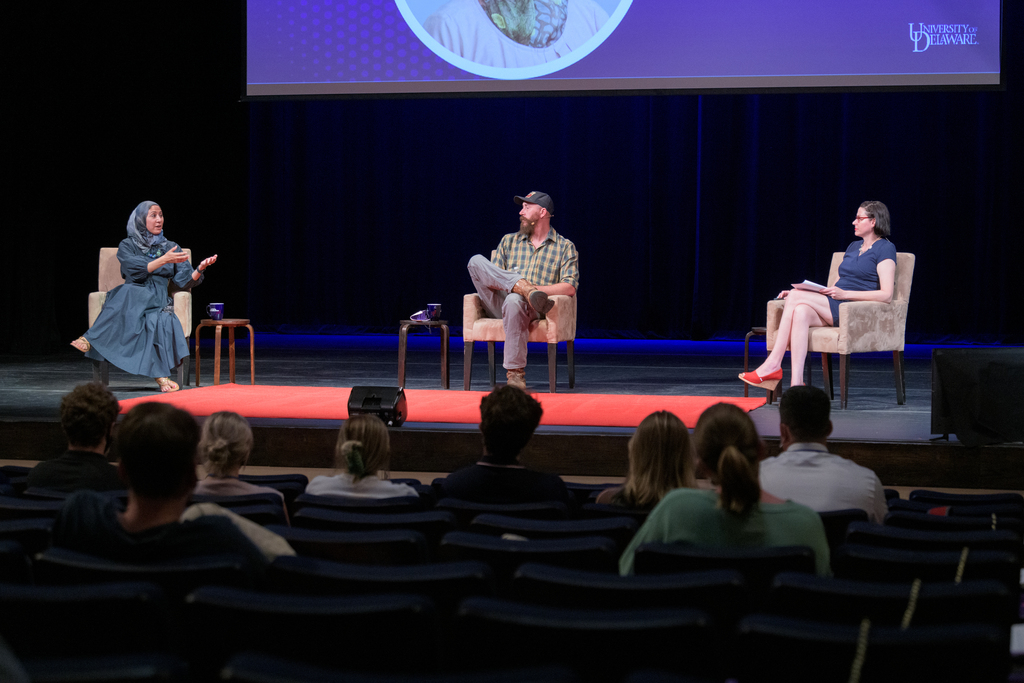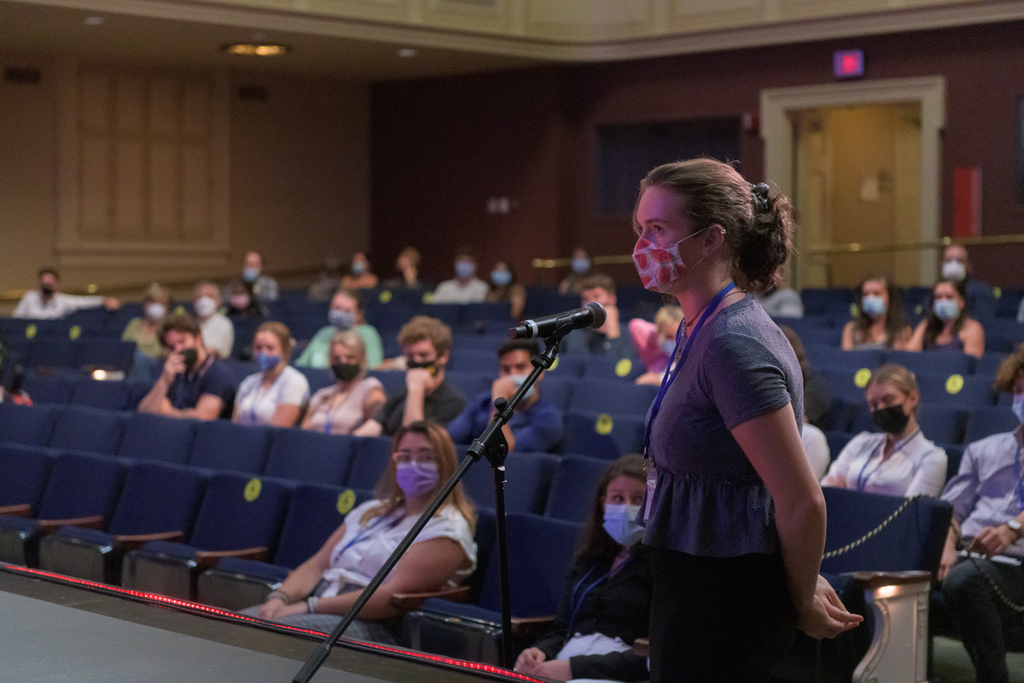National Agenda with David Joy and Asma Khalid : Pursuing new perspectives
A Muslim-American journalist and a rural Appalachian novelist say expand your views in a time of extreme division
By Abbey Negin, University of Delaware sophomore and intern for the University of Delaware’s Center for Political Communication
Watch the video. Read the transcript.
NEWARK, Del. – “Seek out discomfort,” said David Joy, when asked how Gen Zers should prepare for the future. The University of Delaware welcomed back the North Carolinian novelist and NPR White House Correspondent Asma Khalid to the National Agenda stage on Sept. 8, four years after first speaking in 2017 on the theme “As We Stand | Divided.” They discussed the divides and mistrust in America for a second time at UD and for the first time together.
At the opening event of UD’s National Agenda “Reflecting America” series, presented by UD’s Center for Political Communication, Joy and Khalid discussed current political climates. They not only focused on how people learn and consume information, but also the importance of reliable sources. Khalid recalled when someone once sent her a link ending in “ru.” “That’s a Russian site, right? I do not think this is a trustworthy bit of information.”
The conversation highlighted just how complicated the American divide is, how news and information sources have contributed to the decline in effective civil discourse, and how people are now having a tough time fixing the issue.
“I’m a big believer that a lot of the divides we talk about in terms of civil discourse would not exist if social media did not also exist,” said Khalid. People consume fear-fueled misinformation and distrust experts, she said, favoring any “Joe Schmoe” for news, medical opinions, and political information.
Practice active listening

Joy was adamant that civil discourse is lacking not just in American people but also in American politicians. “I don’t want people making decisions that govern whether or not I get healthcare, or somebody can find a job, or any of these big-time decisions, who are incapable of sitting down and having civil discourse with somebody. I want you to be able to do that; with somebody that you disagree with is even better.”
Growing up, Joy’s elders expected him to sit quietly and listen instead of going outside to play. “When I look back, it taught me multiple things from a professional standpoint. It taught me the importance of story and it taught me how to tell a story. But the bigger aspect is that it taught me to listen, and I think that we as a country have lost that entirely.”
Joy and Khalid advocated seeking out new perspectives, as they both come from heavily stereotyped communities: Muslim-Americans and white, southern men. Joy urged Americans to rise above politicization and open themselves up by listening to each other.
“Until we get back to the point where we can sit with people we disagree with, and truly listen to the things that they have to say, I don’t see how we move forward in any type of productive way,” said Joy.
Many of Joy’s thoughts reflected the solitude that comes with living in a rural area. He shared the lessons, positive and negative, of growing up in a small town.As a left-leaning man and a sixth-generation North Carolinian, Joy formed his own views while living in a smaller community where opinions conflicted with his own. Donald Trump easily won in Joy’s own Jackson County in both the 2016 and 2020 elections.
Joy spoke at length about his own beliefs and how his environment has shaped them. Soaking in new knowledge and information helps evolve ideas and worldviews. A self-proclaimed introvert, Joy said he reads books to gain knowledge and new, legitimate perspectives. “Only through constant challenging of your beliefs are you ever going to truly solidify what it is that you believe.”
Joy’s books often focus on the struggles of life in Appalachia, hitting hard topics such as drug use and poverty. His 2015 book, Where All Light Tends to Go, is being adapted into a film starring Robin Wright and Billy Bob Thornton. The book is about a man whose father is a meth dealer, but chooses to accept his life as it is, until something changes.
Khalid’s career began with a by-chance internship at BBC Newshour, where she fell in love with radio news. From there, she went to NPR Boston, where one of her first stories was the Boston Marathon bombing. Her career has taken her to many countries and through many political cycles here in the U.S., covering the 2014, 2016, 2018, and 2020 elections. The NPR White House correspondent also co-hosts The NPR Politics Podcast.
About National Agenda

This was the first of six events this semester. The National Agenda Speaker Series continues with both in-person and virtual events, hosting special guests such as special guest such as autism advocate and author Eric Michael Garcia; March For Our Lives co-founder David Hogg, Delaware State Senator Sarah McBride, and artist and author Nikkolas Smith. For information and to register, visit cpc.udel.edu/nationalagenda. Lindsay Hoffman, Ph.D., an associate professor of communication and political science at UD, directs the series. This year’s theme, “Reflecting America,” examines how this historic era of political divides, social movements, and economic upheavals”fueled by the pandemic and politics”is redefining America. National Agenda is free and open to the public. It is made possible with support from the University of Delaware’s Office of the Provost and the College of Arts and Sciences.
